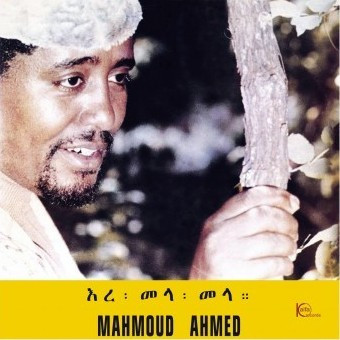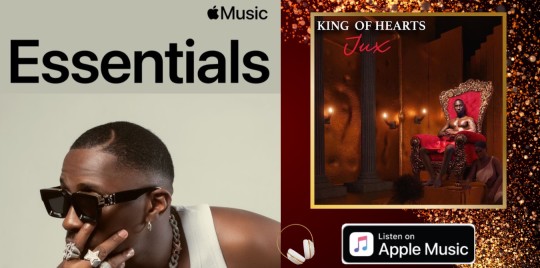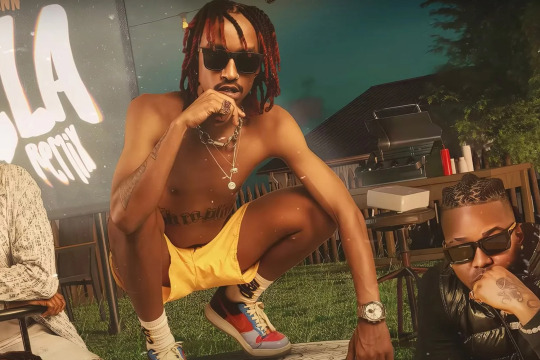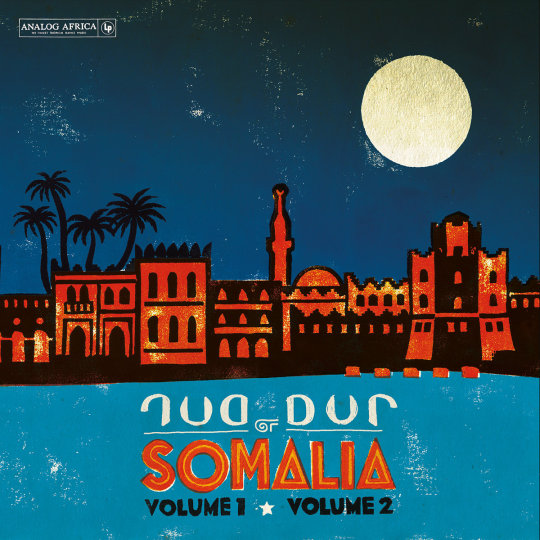#East African music
Explore tagged Tumblr posts
Text
18 notes
·
View notes
Text
339: Mahmoud Ahmed // ማሕሙድ ፡ ኣሕመድ

ማሕሙድ ፡ ኣሕመድ Mahmoud Ahmed 1975, Kaifa (Bandcamp)
Says something extremely cool about Ethiopia circa 1975 that something like this was pop; not merely because the tracks are long and groovy (the case with most African music), but because of their sunblasted grandeur, their fervour. ማሕሙድ አሕመድ (Mahmoud Ahmed, also issued in the ‘80s as Erè mèla mèla) is a formidable work of fusion. I hear notes of the Afrobeat movement that was sweeping West Africa, and the heavy influence of Arabic music from the north and across the nearby Red Sea, but also American spiritual jazz (the latter itself partially derived from African and Eastern sounds). “Sedètègnash Nègn / Samerayé” and “Endénèsh Gèdawo” are among the most striking African recordings I’ve heard, built on mesmerizing, helixing odd-time double bass rhythms stabbed through by blurts of saxophone, like someone repeatedly skewering a serpent with a barbecue fork. The ritualistic air conjured by the Ibex Band and Ahmed’s tremulous, utterly committed vocal makes me think of Exuma and, oddly, Black Sabbath-era Ozzy—a frail, human figure both captivated by the musical powers he commands and pushed to the limits of his sanity.
youtube
Much of the record is lighter fare, like “Abay Mado” and “Erè mèla mèla,” and they have their own sway, kissed by flickers of organ, electric guitar, and even flute. These tunes exude an ambient sense of good will, like some musical healing practice, and make a welcome contrast to the more intense jams—they’re so lulling in fact that if I’m doing something else while I listen I can almost forget what I’ve got on, until something freaky like “Ohoho Gédama” drops. I wish I could speak more to the lyrics, but online translators seem to brick Amharic, to the point I couldn’t even tell you what most of the titles mean. I’ve little doubt though that they deal with the same universal concerns as most music of the time and place: the love and fear of love and God. You can party to this, and you can meditate to it, and you can absolutely break in an extremely elaborate hookah to it. Highly recommended.
339/365
#mahmoud ahmed#ethio jazz#ethiopia#ethiopiques#ethiopian music#east africa#east african music#afrobeat#'70s music#ibex band#music review#african music
3 notes
·
View notes
Text
Exploring the Unique Sound of Jux: A Tanzanian Music Sensation
Jux Genre: Bongo Flava, Afrobeat, R&B In the vibrant world of Tanzanian music, one artist has consistently stood out with his distinctive sound, charismatic presence, and remarkable achievements. Born Juma Mussa Mkambala, but known to fans as Jux, this talented musician has carved a niche for himself in the East African music scene. In this review, we’ll take a closer look at the life,…

View On WordPress
#Afrobeat#Afrobeat music#album#All-in-One#Apple#apple iphone#apple itunes#apple music#apple store#artist achievements#available in Kenya#Bad#Beat It (Single Version)#beat music#Best Artist 2020#Bongo Flava#Bongo Flava fusion#catchy melodies#chart-topping hits#East African music#global#H&S Magazine&039;s Best Artist Of The Week#hit songs#itunes#itunes store#Jux#Jux - Incase You Don&039;t Know (Official Music Video) ft. Nyashinski#Jux - Sugua [Feat. Diamond Platnumz] (Official Music Video)#Jux - Unaniweza (Official Music Video)#Jux & Gyakie - I Love You (Official Music Video)
2 notes
·
View notes
Text

youtube
#tanzania#east africa#zimbabve#kenya#ethiopia#uganda#afrobeats#amapiano#east african music#music#art#soul#youtube#culture#afro art#motherland#okayplayer#okayafrica#zuchu#napambana#Youtube
2 notes
·
View notes
Text
Kenya's Bien Champions East Africa’s Global Music Takeover
Photo: Bien-Aimé Baraza courtesy of Earth Agency Anyone who is friends with their screen—television, handset or otherwise—is well aware of the velocity with which the African music is evolving. And yes, the excitement accompanying this growth is as hair-raising as it is heart-racing. Yet, like the rest of the continent, East African music artistes in the process of this evolution are being…
0 notes
Text
Ronald Mayinja Hits it Beyond Capacity - Serena Hotel Live

View On WordPress
0 notes
Text
youtube


#african#kemetic dreams#afrakan#africans#brown skin#afrakans#african culture#brownskin#afrakan spirituality#kenya#africa#epic video#music video#east africa#Youtube
12 notes
·
View notes
Text
1975
Fahra by Hany Mehanna : traditional Middle Eastern melodies with lush, cinematic arrangements.
Its intricate percussion, vibrant strings, and playful organ riffs are truly hypnotizing!
#Hany Mehanna#arabic#oriental#Experimental#Farfisa#Cairo#Egyptian#Egypt#Middle East#Middle Eastern#instrumental#Africa#African#belly dance#1970s#70s#music#Bandcamp
11 notes
·
View notes
Text
I'm thinking of starting a series to highlight different theatrical works to help bring awareness to plays and musicals that maybe don't get as much notice, but also to help fill in people's knowledge gaps.
Are there shows you want to know more about? Or want me to highlight one of your faves? Ask box is open.
#theatre#theatre studies#musical theatre#broadway#drama#theatre history#a lot of my knowledge comes from an american perspective#but i have been wanting to study east african theatre more#so you'll probably get a healthy mix of US and international work
5 notes
·
View notes
Text
The ongoing rap discourse is really funny to me because like. Music is not a universal language. That's a stupid cliché. People like stuff that sounds kinda like stuff they've heard before because their brains already know how to process it. British people were super racist about it during the whole empire gambit. Now things spread more easily and people listen to a lot more variety of stuff than they used to, but there are still variables by language, region, platform, and, yes, class and race.
So you want to earn discourse points by listening to rap. Cool! Good, even! Expand your horizons! Start with some simple things. But also, you're making the assumption that all black or even non-white music is Black American music, maybe you'd like music from Saharan cell phones, or kalimba, or goto, or...
Maybe you want to earn discourse points by telling other people to listen to rap, and that they're bad people for not doing so. O-kay... but you're also losing discourse points by not considering neurodivergence, because the mental barrier to trying a new music can be significantly higher or even physically painful depending on your divergence.
You can't win the discourse war, guys. And you usually have more luck getting people to try things by being enthusiastic and providing links.
#which I would get into but I will absolutely Murder Hyacinth for happening to listen to a show in the same room if I do#there's a Beautiful Feet song and something in my head as Ntsephile Mai#obvs Béla Fleck and Rose from Concrete#Tinariwen got me so good I had autistic shutdown in a park#and Mum had to explain to a worried cousin that I was enjoying myself A LOT and that's why I had stopped moving or making expressions#the goto/koto is really cool and there's an instrument with 20+ strings played with the THUMBS#I don't know enough about Arabic/east African music to recommend it#Mongolian throat singing is cool but not my thing much like lagoon fluting or the piano#just. there's so much in this world. and y'all are arguing it's racist to not listen to rap
6 notes
·
View notes
Text



I 🖤 Real Hiphop 🎼💯
Happy 50th 🎂🎼Hiphop
#hip hop music#50 years old#soundcloud#billboard#vh1#Hard-core 70_80_90_200.#def jam#bad boy records#Ruthless_Record deathrowrecords#bet#hollywood#v mm#vintage#photography#black and white#east coast#west coast#north coast#south coast#african music#rap music#music video#spotify#apple music#youtube
2 notes
·
View notes
Video
youtube
21 year old Kenyan Rapper Ghost Austino Just dropped another banger 🔥🔥🔥💯
HUANGA MBAYA is now out on YouTube. Watch, comment, like , share and subscribe.Thank you 😁
#afropop#afrohiphop#afrotrap#Kenyan music#Kenya#kenyan#African Hip Hop#kenyan hip-hop#fire brigade#rasta#east africa
4 notes
·
View notes
Text
278: Dur Dur Band // Dur Dur of Somalia Volume 1 & Volume 2

Dur Dur of Somalia Volume 1 & Volume 2 Dur Dur Band 2018, Analog Africa (Bandcamp)
I’m not going to stand here and tell you directly that Dur-Dur Band is the greatest African group of all time, but if the thought kinda worms around in your brain a lil, well, more to the good. Back in the ‘70s and ‘80s, Mogadishu, Somalia was one of the most happening cities on the continent, and Dur-Dur Band (Somali for Water Stream) held down a residency at a top hotel. They achieved enough local notoriety to have a chance to record some tapes, and their music was in heavy rotation on local radio. In contrast to Ghana and Nigeria, the most well-known loci for Afro-funk, Somalia lies on the east coast of the continent, and Mogadishu was traditionally a cultural hub in which Arabic and Indian influences mixed with the indigenous Somali culture. Colonial occupation by the Italians and the British thickened the stew, and as a result the milieu that produced Dur-Dur was cosmopolitan even by the standards of coastal Africa.
youtube
Released in 1986 and 1987 respectively and reissued as a triple LP in 2018 by Analog Africa, Dur-Dur’s Volume 1 and Volume 2 cover a ton of sonic territory, though their core sound is the type of exquisitely groovy horn-driven funk that drives aficionados nuts. The production is nice and raw (Volume 1 was recorded in a single afternoon session at a Mogadishu club) but robust and bass-heavy, and there are also some extremely tasty synth sounds that gesture towards the more electronic sounds happening at the time in places like South Africa. I don’t know what you’re supposed to do with yourself when something like the funk-centipede-conga-line “Doon Baa Maraysoo” kicks your door down and starts boogieing around the house other than join in.
While the band evidently played plenty of foreign music in their marathon stage sets, on record they focused on their novel fusion of these influences with local rhythms. The jittering “Jubba Aaka” matches dense hand-drummed percussion a la Sufi trance music and highlife horns with sassy boy-girl call and response vocals that wouldn’t be out place in a Bollywood dance number; the brief “Saafiyeey Makaa Saraayeey” is a trippy dub blues with fake-out record skips and ululating vocal runs redolent of Islamic prayer music; “Diinleeya” clearly pulls from classic reggae music, but also Dhaanto, a Somali folk dance with a similarly skanking rhythm. The compilation keeps you on your toes; “Salkuu Dhigey,” one of the previously unreleased tracks, has this insistent bleeping guitar figure and shifty beat that makes me think of a like, DJ Koze beat or something.
youtube
Basically everything on here slaps. Dur-Dur Band for World President.
278/365
#dur dur band#dur-dur band#analog africa#somalia#somali music#afrobeat#afro funk#'80s music#african music#east african music#east africa#music review#vinyl record
3 notes
·
View notes
Text
Harmonize: The Tanzanian Star Shaping the Bongo Flava Scene
Unveiling the Bongo Flava Maestro In the vibrant world of African music, one name shines particularly bright: Harmonize. Hailing from Tanzania, Harmonize has not only made a name for himself but has also significantly influenced the Bongo Flava genre. Join us as we delve into the life and achievements of this Tanzanian music sensation who has captured the hearts of many across the globe. Genre:…

View On WordPress
#African music awards#Afro East#album#All-in-One#Apple#apple iphone#apple itunes#apple music#apple store#available in Kenya#Bad#Beat It (Single Version)#beat music#Best Artist 2020#Bongo Flava#East African music#global#H&S Magazine&039;s Best Artist Of The Week#Harmonize#Harmonize - Happy Birthday (Official Music Video)#Harmonize - Single Again (Official Music Video)#Harmonize Ft Diamond Platnumz - Kwangwaru (Official Music Video)#Harmonize Ft Ruger - Single Again Remix (Official Music Video)#international collaborations#itunes#itunes store#Kenya#MTV EMA winner#music achievements#music amplifier
1 note
·
View note
Text
The influence of Dance hall and Caribbean music on East African music is undoubted.
#arbanvibe #arbantone
#kenya#arbantone#arbanvibe#kenyan urban culture#urban africa#african music#african dancehall#nairobi#ektomist#ghost austino#ybw smith#lil maina#trio mio#boutross#east africa
0 notes
Text
The Middle Geeks Episode 67: Star Wars: The Acolyte Season 1 Review
The Middle Geeks review Leslye Headland's 'Star Wars: The Acolyte', whose writers include acclaimed Turkish-American writer Kor Adana.
Arezou joins us once again along with new guest Noor to review one of the most riveting Star Wars series yet. Continue reading The Middle Geeks Episode 67: Star Wars: The Acolyte Season 1 Review
#African-American#Amandla Stenberg#Asian#Asian American#comedy#Disney#Disney+#East Asian#Eileen Shim#film#Gaza#Kogonada#Kor Adana#korean#Lee Jung-jae#Leslye Headland#LGBT#LGBTQ#Manny Jacinto#Movies#music#Palestine#Polite Society#Star Wars#Star Wars: The High Republic#Streaming#SWANA#The Acolyte#The High Republic#The Middle Geeks
1 note
·
View note